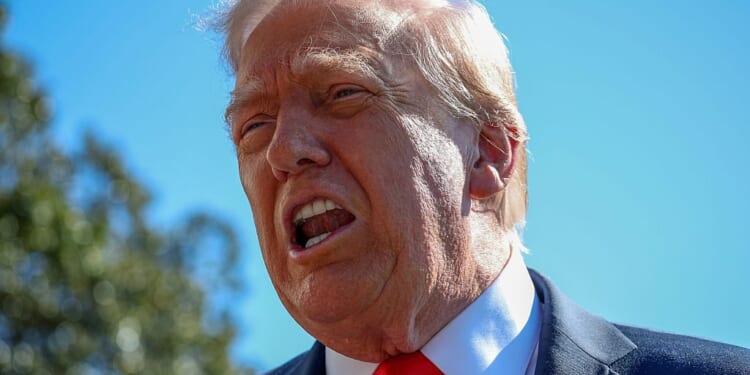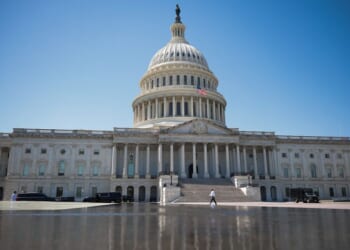What comes next for the Republican Party after President Trump is gone? Not since at least FDR has a single figure dominated a US party so thoroughly and for so long. But Trump won’t live forever, and a much-fantasized-about third term is blessedly unlikely. It’s tempting to imagine that his departure from the scene — one way or another — will restore the GOP as a normal center-Right party pursuing growth, opportunity, and good governance.
Unfortunately, as conservatives position themselves for the post-Trump future, there are indications that what is coming is likely to be much worse: more conspiratorial, hostile to institutions, and beholden to a pinched and angry nationalism. If anything, Trump has been a moderating force against these tendencies. After him, the deluge.
Consider that last month, the surgeon general of Florida, Dr. Joseph Lapado, and allied legislators announced a sweeping plan to eliminate all childhood vaccine mandates. Lapado declared that even long-established requirements for diseases like chickenpox, hepatitis B, and the like “drip with disdain and slavery.” Within days, the proposal began to collapse under political pressure, especially after Trump himself criticized the idea. This forced Sunshine State health authorities to backtrack, converting the plan into a more limited rollback of a few optional immunizations, while leaving core school-entry vaccines intact for now.
The idea of Trump as a moderating force within the GOP might seem absurd at first glance. Yet this is only one of many data points suggesting that he is, in fact, holding back some of the worst impulses and brainstorms pushed by figures who have now gained control over American conservatism.
There are two indicators we may look for in forecasting the future of a movement. The first involves examining areas in which the base and its spokesmen show resistance against the ultimate leader. There is a natural tendency to defer to the leader of a party, but tensions always exist between him, those in the middle ranks, and the base, and where the pressure points are can tell us something.
This method would have accurately predicted the Republican Party’s hard turn against immigration in the aftermath of the Bush and McCain era, during which talk radio helped dash proposals for a grand bargain supported by GOP elites. We’ve seen something similar on the Democratic side over the last year, with the party mainstream abandoning support for the Israeli war effort in response to pressure from the Left flank.
The other method involves assessing a movement’s information ecosystem. I would argue that this is a more useful guide than general public opinion within a party, since most people aren’t thinking about most issues most of the time, and it is the opinion-forming class of today within each that shapes what normies will care and vote about tomorrow. On the Democratic side, the relevant elites are the prestige press and the liberal activist class; for Republicans, it’s Fox News, major podcasts, and the community of Right-wing influencers on “X” (formerly Twitter).
Both indicators suggest that the post-Trump GOP will be more conspiratorial, more deeply in thrall to pseudoscience, and more likely to hold uncompromising attitudes toward immigrants and political opponents.
Consider how the GOP base itself has often resisted Trump when he has strayed from its instincts. At the height of the pandemic and for years after, he touted the success of Operation Warp Speed, which invented the mRNA vaccines used against Covid. Trump also encouraged his supporters to take the jabs, only to be met with boos at rallies and open defiance from talk radio and online influencers, forcing him into a sheepish retreat.
More recently, conservative media have been buzzing with demands to release the Epstein files, a subject Trump has largely ignored, given his past associations. Yet the online Right remains unrelenting in its obsession with the issue, even generating memes that characterize Trump as a “pedo protector.”
When it comes to high-skilled immigration, meanwhile, Trump has sometimes gestured toward Silicon Valley’s and corporate America’s desire for more engineers and programmers. Yet grassroots activists, talk-radio hosts, and social-media influencers have maintained fierce anti-immigration pressure, ensuring that any liberalizing reform will be met with an immediate backlash.
Such episodes highlight that there is more to Republican politics now than simple deference to Trump himself. There is a populist current that will outlive him, and it rewards conspiracy-minded narratives and punishes any gesture toward compromise on the immigration issue.
Note that the backlash isn’t coming in response to Trump’s glaring corruption, such as engaging in crypto scams and accepting a private jet from the Qataris. Nor does the base seem all that exercised by cuts to Medicaid and other entitlements, contrary to the expectations of disappointed populists like Sohrab Ahmari and Oren Cass. That’s not where the GOP base’s heart lies. Instead, it’s immigration and the threat posed by shadowy, vaccine-pushing elites, which include all Democrats and any elected Republicans who fail to go full-bore MAGA.
“There is a populist current that will outlive him.”
The trajectory of Right-wing media is similarly instructive. According to Spotify, the top-four news podcasts today are The Tucker Carlson Show, The Daily from The New York Times, Candace, and Up First from National Public Radio. This supports the general conclusion that Democrats listen to traditional media elites, while Republicans have influencers.
What distinguishes the Right’s influencers at the most basic level isn’t policy outside the aforementioned exceptions of immigration and vaccines — when was the last time you heard Candace Owens’s position on the size of government? — but a general conspiratorial outlook. Carlson has argued that UFOs are interdimensional demons and has spent the weeks since Charlie Kirk’s death hinting that Israel was behind the assassination. Owens is being sued by Brigitte Macron for promoting the idea that France’s first lady was born a man.
Right-of-center influencers who want to climb the rankings must follow this deranged path. Megyn Kelly is also among the top-10 news influencers, albeit toward the bottom at No. 9. Perhaps to boost her audience, she has begun to warn about demons interfering in earthly affairs and implying that vaccines cause autism, deep truths supposedly covered up by the mainstream media. She also declares that she does not care about reports that border czar Tom Homan was allegedly caught on tape receiving a $50,000 cash bribe, as long as he is tough enough on illegal migrants. A once sensible media voice detects which way the wind is blowing, and has changed her views accordingly.
To be sure, the GOP will be better off without some of Trump’s worst flaws. The cult-like aspect of his movement meant that large numbers of people could look past any level of personal corruption and even storm the Capitol on his behalf. It is difficult to imagine JD Vance or Ron DeSantis acting this way after losing an election, or inspiring thousands of people to risk their physical safety and freedom in a misinformation-fueled effort to keep either of them in office.
But Trump also has a pragmatic streak and common sense when it comes to issues like vaccines and immigration, and whether conspiracy theories are credible. His base, in contrast, makes hostility to foreigners and distrust of the liberal establishment central to its worldview, and the figures that are most successful among conservative audiences reflect the kind of content that Republican-leaning listeners and viewers find compelling.
If there are countervailing forces within the Republican Party they remain mostly hidden for now. In fairness, mainstream Republicans have put pressure on RFK over his anti-vaccine positions, and likely have stopped the Department of Health and Human Services from embracing pseudoscience even more than it has. When Trump has tried to prosecute his enemies on flimsy pretexts, he has encountered resistance even among his appointees. In order to get his indictment of former FBI Director James Comey, the president had to push out his own US attorney for the Eastern District of Virginia and replace him with one of his personal lawyers, over the objections of his top-two officials at the Department of Justice, one of whom had also served as his personal lawyer.
As with Jan. 6 and the events leading up to it, it is difficult to imagine a similar story involving any other Republican leader. Trump is an outlier both in terms of how flawed he is as an individual, and also in the kind of personal grip he maintains on the GOP base. Top attorneys in the executive branch aren’t Twitter influencers, and have their own code of ethics and professional norms. They will resist a leader who tries to get them to do things that are too far outside of the bounds of legality and established norms. Still, working under Trump makes the ability to draw red lines much more difficult.
Yet when it comes to conspiratorial thinking and anti-foreigner scapegoating, the demand is organic and likely to persist even after Trump. Partly, this is the result of a more general political realignment of which Trump is both a cause and symptom. While people with less formal education and low levels of trust, two predictors of conspiratorial thinking, used to be somewhat divided between the parties, they have now consolidated on the Right, as the decline of gatekeepers allows them to have more of a voice in our politics. The Trump cult in certain ways puts a lid on such instincts, but even as he maintains control over the GOP, divisions between the leader and the base still occasionally rise to the surface.
After Trump, the conservative movement will find itself at a crossroads, but one that is unlikely to point back toward moderation or institutional responsibility. Trump’s departure, whenever it comes, won’t mean a simple reversion to pre-2016 norms, because the forces he has unleashed and the informational environment that sustains them are larger than the man himself.
The two lenses for understanding the party’s trajectory — pushback against the leader and the informational ecosystem — reveal the general direction of travel: namely, conspiratorial populism. Elites who try to resist their base, as we saw with immigration reform under George W. Bush or Trump’s attempt to promote vaccines for the sake of his own ego gratification, are quickly punished, and those who play to fanatical audiences are the most richly rewarded.
When Trump exits the stage, what remains will be a Republican Party still driven by grievance and suspicion — minus a major check on where those impulses can lead.

















